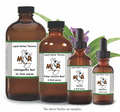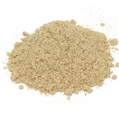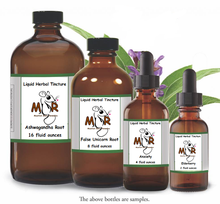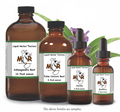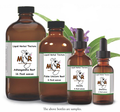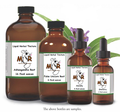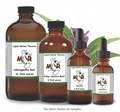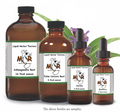 Loading... Please wait...
Loading... Please wait...- Home
- Herbal Tinctures
- Herbal Tinctures - Combination
- Neuropathy & Nerve Pain Support Tincture
Neuropathy & Nerve Pain Support Tincture
Product Description
Neuropathy & Nerve Pain Support
Living with nerve pain can be a long-term proposition. Some neuropathic pain gets better with treatment or on its own, but that can take months or years. Other nerve pain stays the same for years or worsens slowly. Some nerve pain can't be reversed.
Neuropathy is a term that refers to general diseases or malfunctions of the nerves. Nerves at any location in the body can be damaged from injury or disease. Neuropathy is often classified according to the types or location of nerves that are affected. Neuropathy can also be classified according to the disease causing it. (For example, neuropathy from the effects of diabetes is called diabetic neuropathy.)
Types of Neuropathy
Peripheral neuropathy: Peripheral neuropathy is when the nerve problem affects the nerves outside of the brain and spinal cord. These nerves are part of the peripheral nervous system. Accordingly, peripheral neuropathy is neuropathy that affects the nerves of the extremities- the toes, feet, legs, fingers, hands, and arms. The term proximal neuropathy has been used to refer to nerve damage that specifically causes pain in the shoulders, thighs, hips, or buttocks.
Cranial neuropathy: Cranial neuropathy occurs when any of the twelve cranial nerves (nerves that exit from the brain directly) are damaged. Two specific types of cranial neuropathy are optic neuropathy and auditory neuropathy. Optic neuropathy refers to damage or disease of the optic nerve that transmits visual signals from the retina of the eye to the brain. Auditory neuropathy involves the nerve that carries signals from the inner ear to the brain and is responsible for hearing.
Autonomic neuropathy: Autonomic neuropathy is damage to the nerves of the involuntary nervous system. These nerves that control the heart and circulation (including blood pressure), digestion, bowel and bladder function, the sexual response, and perspiration. Nerves in other organs may also be affected.
Focal neuropathy: Focal neuropathy is neuropathy that is restricted to one nerve or group of nerves, or one area of the body.
Neuropathy Causes
Nerve damage may be caused by a number of different diseases, injuries, infections, and even vitamin deficiency states.
Diabetes: Diabetes is the condition most commonly associated with neuropathy. The characteristic symptoms of peripheral neuropathy often seen in people with diabetes are sometimes referred to as diabetic neuropathy. The risk of having diabetic neuropathy rises with age and duration of diabetes. Neuropathy is most common in people who have had diabetes for decades and is generally more severe in those who have had difficulty controlling their diabetes, or those who are overweight or have elevated blood lipids andhigh blood pressure.
Vitamin deficiencies: Deficiencies of the vitamins B12 and folate as well as other B vitamins can cause damage to the nerves.
Autoimmune neuropathy: Autoimmune diseases such as rheumatoid arthritis, systemic lupus, and Guillain-Barre syndrome can cause neuropathies.
Infection: Some infections, including HIV/AIDS, Lyme disease, leprosy, and syphilis, can damage nerves.
Post-herpetic neuralgia: Post-herpetic neuralgia, a complication of shingles (varicella-zoster virus infection) is a form of neuropathy.
Alcoholic neuropathy: Alcoholism is often associated with peripheral neuropathy. Although the exact reasons for the nerve damage are unclear, it probably arises from a combination of damage to the nerves by alcohol itself along with the poor nutrition and associated vitamin deficiencies that are common in alcoholics.
Genetic or inherited disorders: Genetic or inherited disorders can affect the nerves and are responsible for some cases of neuropathy. Examples include Friedreich's ataxia and Charcot-Marie-Tooth disease.
Amyloidosis: Amyloidosis is a condition in which abnormal protein fibers are deposited in tissues and organs. These protein deposits can lead to varying degrees of organ damage and may be a cause of neuropathy.
Uremia: Uremia (a high concentration of waste products in the blood due to kidney failure) can lead to neuropathy.
Toxins and poisons can damage nerves. Examples include, gold compounds, lead, arsenic, mercury, some industrial solvents, nitrous oxide, and organophosphate pesticides.
Drugs or medication: Certain drugs and medications can cause nerve damage. Examples include cancer therapy drugs such as vincristine (Oncovin, Vincasar), and antibiotics such as metronidazole (Flagyl), and isoniazid (Nydrazid, Laniazid).
Trauma/Injury: Trauma or injury to nerves, including prolonged pressure on a nerve or group of nerves, is a common cause of neuropathy. Decreased blood flow (ischemia) to the nerves can also lead to long-term damage.
Tumors: Benign or malignant tumors of the nerves or nearby structures may damage the nerves directly, by invading the nerves, or cause neuropathy due to pressure on the nerves.
Idiopathic: Idiopathic neuropathy is neuropathy for which no cause has been established. The term idiopathic is used in medicine to denote the fact that no cause is known.
This Tincture will provide your body with all the nutrients it needs to support healthy nerve function and help relieve the symptoms of neuropathy. Each ingredient has been carefully chosen to address the various complications of nerve damage.
So lets stop the sharp pins-and-needles pain that attacks your feet make life miserable, and all the time wasted on worrying about your health get you nowhere. It can start to feel out of your control…With expensive medication only providing a band-aid to these symptoms and sometimes making them worse, many are left to accept this condition. We don’t think they should have to.
Made from natural ingredients without gluten, dairy products, preservatives, artificial flavoring, water filler, dyes, or coloring.
With regular use, most of our customers report noticeable improvements in the first week or two (some sooner!) with continued, gradual improvements thereafter.
Ingredients: White Willow Bark, Turmeric Root, Devil’s Claw Root, Skullcap Herb, Passionflower Leaf, Spirulina Algae (Omeg-3 & Omega-6), Corydalis Root, Feverfew and certified organic grain alcohol.
This herbal tincture contains Corydalis Rhizome (Yan Hu Suo) which is an herb that helps treat chronic nerve pain. According to Dr. Ray Sahelian, a medical doctor, nutrition expert and author, corydalis, also known as Corydalis yanhusuo or Corydalis bulbosa, is an herb used in traditional Chinese medicine to treat health problems including allergies, cardiovascular conditions, cataracts, inflammation and pain. Dr. Sharol Tilgner, a naturopathic physician and author of the book "Herbal Medicine From the Heart of the Earth," states that corydalis is related to the opium poppy. Corydalis has some of the same pain-relieving and sedative properties of the opium poppy, although it is milder in action than opium. Sahelian states that Corydalis yanhusuo may have potential clinical value for treating mild to moderate pain. Before taking corydalis to help to stop your chronic nerve pain, talk with your doctor about possible side effects and proper dosage.
The tincture will arrive in a 2 or 4 fluid ounce amber glass bottle with black dropper. Please read bottle label for recommended dosage and read the information mailed with your tincture. Take with water. Shake well prior to use. To maximize shelf life please store upright in a cool, dark location.
Suggested: As a dietary supplement take 10 drops (1/4 tsp or 1.23ml) 1-3 times a day or as needed. Take with a full glass of water and make sure you drink 5-8 ounce glasses of water throughout the day.
Disclaimer: These products are not intended to diagnose, treat cure or prevent any disease. Reviews are not intended as a substitute for appropriate medical care or the advice of a physician or another medical professional. Actual results may vary among users. Mountain Maus Remedies LLC makes no warranty or representation, expressed or implied, as to the accuracy or validity of the information contributed by outside product review submissions, and assumes no responsibility or liability regarding the use of such information. The information and statements regarding the dietary supplements have not been evaluated by the Food and Drug Administration. If you have a medical condition or disease, please talk to your health care provider. If you are currently taking a prescription medication, you should work with your health care provider before discontinuing any drug or altering any drug regimen, including augmenting your regimen with any herb or dietary supplements. Do not attempt to self-diagnose any disease or ailment based on the reviews and do not use the information contained herein for diagnosing or treating a health problem or disease. Proper medical care is critical to good health. If you have a health concern or suspect you have an undiagnosed sign or symptom, please consult a physician or health care practitioner.
Find Similar Products by Tag
Find Similar Products by Category

Product Reviews
-
Be mindful of your body

Posted by KT on 24th Apr 2023
I walk 7.5 hours/day on concrete at work everyday. My feet mostly, and legs were killing me. That is gone. I do not have to take this everyday though now like in the beginning which is nice. Every few weeks after the initial 3 weeks of daily use. The pain was unbearable. I do know that there is timing “for me” which works with this tincture. I can take 3 drops and be fine for a few hours. At 12 drops I sleep. So I usually take it after I get home from work when I can relax and then 3 drops right before I go to work for maintenance.
-
Effective

Posted by Kelly Hoh on 26th Jul 2018
My mother suffers from numbed legs and I wrote to Mountain Maus Remedies. They took time and pains to read through the conditions I outlined and wrote back a 2-pager explaining the possible causes of the symptoms. What's amazing is they did not even ask me to buy their products but pointed out other off-the-counter vitamins to start with. I proceeded to purchase this product because of absolute genuine trust in someone wishing the patient to get well.
My mother told me that her feet's swelling (and numbing) have subsided, hence making her able to feel the ground or be better in her mobility overall. She still can't walk in stride but the product helps in reducing the bulky feet she had before. She asked me to get her a second bottle when she's religiously used the first bottle (ten drops a day).
Thank you for your products and your spirit. With love and light, thank you.
-
No more pain in my feet or hands

Posted by D. Tradinson on 16th Dec 2017
I was referred to MMR several months ago from my Doctor who suggested using alternative methods before introducing harsher medication. Surprise because who would have thought a medical doctor would send a patient elsewhere to be treated with weeds and plants!
For 2 months now I have been taking this tincture 3x a day with an added recommend dose of Acerola berry extract which has 4.5% vitamin C per fruit compared to 0.05% found in a peeled orange, and also provides double the amount of magnesium, potassium and pantothenic acid as found in oranges. It also is a significant source of vitamin A which is a deficiency know to be linked to diabetic nerve pain.
Within 6 days I noticed a significant change in my hands and the pain was diminishing. Within 12 days I was noticing the same for my feet. Am I happy with the results so far? That is a big YES!!! Blood test are all good and my doctor has given me the go ahead to continue with this treatment as recommended by MMR.
Thank you so much for helping me medicinally.
-
Works

Posted by Trevor Martin on 11th Jan 2017
For about five years now, I have been pains right from the left side of my body(head to thigh) with concentration around my neck, shoulder and thigh. The pains at is gripping and tightening extending to the fingers with burning sensation. Investigation revealed nerve damage due to diabetes. I was on regular pain relieving drugs with little or no relief until I tried this. It works and does not interfere with my injections, after 6 days I started to notice a change and by the second week I had a little pain but not like it was before.
-
I definitely recommend trying this product if you are suffering from neuropathy.

Posted by Anne Taylor on 6th Jan 2017
I unfortunately developed polyneuropathy (numbness, tingling, and burning in arms, legs, hands & feet) after having a craniotomy. Most likely caused by the horrible steroids I had to take before, during, and after surgery. The pain was 24/7. After an exhausting internet search for relief I found this website and gave it a try. It has relieved the terrible burning in my arms and legs and has decreased the tingling in my hands and feet during the daytime. The numbness in my feet at bedtime has decreased greatly (but not completely) which of course has helped with sleeping. I refuse to take drugs of any kind (which the doctors are so apt to prescribe) so I was happy to find a homeopathic treatment. The taste at first was a little unsettling but I got used to it and now don't mind it at all. I usually use two droppers under my tongue three times per day.
-
Taste horrible!

Posted by Jacquilline Stamper - Ebay Review 1.3.17 on 5th Jan 2017
I must say that I almost left off one star because of the taste. It is not horrible, it is just not delightful. I have mild neuropathy and was very excited about trying this product. It does exactly what it says. I feel that it helps with my extreme discomfort in my legs. It has a soothing effect, especially for my pins and needles feelings. I will purchase it in the future. I highly recommend it for people with neuropathy.
-
Works!

Posted by Thomas Veter on 5th Jan 2017
I started taking this tincture for severe peripheral neuropathy due to auto immune issues. I have found great relief for the burning in my feet, but still have a little of the numbness left in my toes which Im hoping will eventually come right too. I have also found a big improvement in my mental state due to small blood vessel disease of the brain. My mental function is back to normal plus I have my balance back and am able to enjoy dancing again. Fantastic results and can highly recommend to others. Sure beats going on medication for epilepsy and anti depressants to open up the blood vessels.






